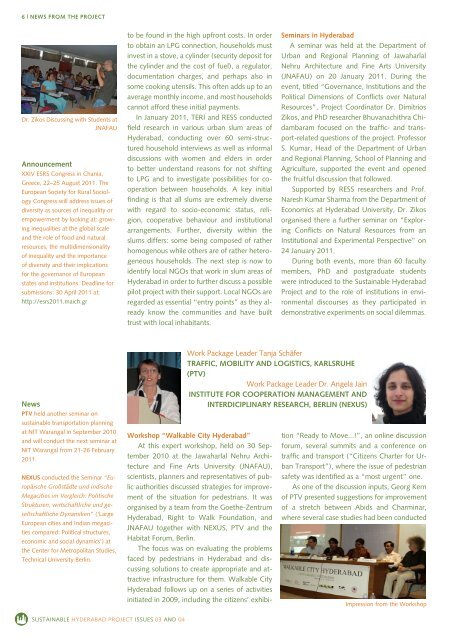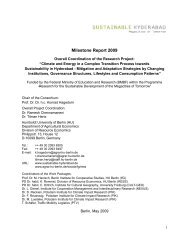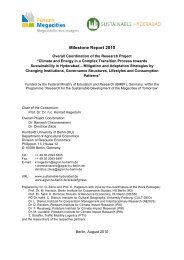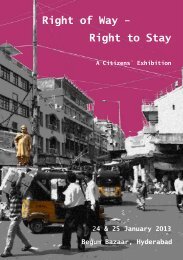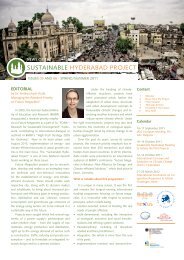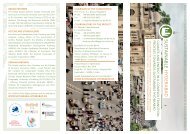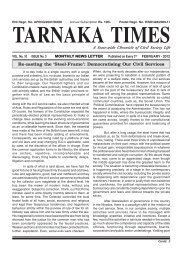SUSTAINABLE HYDERABAD PROJECT
SUSTAINABLE HYDERABAD PROJECT
SUSTAINABLE HYDERABAD PROJECT
Create successful ePaper yourself
Turn your PDF publications into a flip-book with our unique Google optimized e-Paper software.
6 | NEWS FROM THE <strong>PROJECT</strong>ORIAL<br />
Dr. Zikos Discussing with Students at<br />
JNAFAU<br />
Announcement<br />
XXIV ESRS Congress in Chania,<br />
Greece, 22–25 August 2011. The<br />
European Society for Rural Sociology<br />
Congress will address issues of<br />
diversity as sources of inequality or<br />
empowerment by looking at: growing<br />
inequalities at the global scale<br />
and the role of food and natural<br />
resources, the multidimensionality<br />
of inequality and the importance<br />
of diversity and their implications<br />
for the governance of European<br />
states and institutions. Deadline for<br />
submissions: 30 April 2011 at:<br />
http://esrs2011.maich.gr<br />
to be found in the high upfront costs. In order<br />
to obtain an LPG connection, households must<br />
invest in a stove, a cylinder (security deposit for<br />
the cylinder and the cost of fuel), a regulator,<br />
documentation charges, and perhaps also in<br />
some cooking utensils. This often adds up to an<br />
average monthly income, and most households<br />
cannot afford these initial payments.<br />
In January 2011, TERI and RESS conducted<br />
field research in various urban slum areas of<br />
Hyderabad, conducting over 60 semi-structured<br />
household interviews as well as informal<br />
discussions with women and elders in order<br />
to better understand reasons for not shifting<br />
to LPG and to investigate possibilities for cooperation<br />
between households. A key initial<br />
finding is that all slums are extremely diverse<br />
with regard to socio-economic status, religion,<br />
cooperative behaviour and institutional<br />
arrangements. Further, diversity within the<br />
slums differs: some being composed of rather<br />
homogenous while others are of rather heterogeneous<br />
households. The next step is now to<br />
identify local NGOs that work in slum areas of<br />
Hyderabad in order to further discuss a possible<br />
pilot project with their support. Local NGOs are<br />
regarded as essential “entry points” as they already<br />
know the communities and have built<br />
trust with local inhabitants.<br />
Seminars in Hyderabad<br />
A seminar was held at the Department of<br />
Urban and Regional Planning of Jawaharlal<br />
Nehru Architecture and Fine Arts University<br />
(JNAFAU) on 20 January 2011. During the<br />
event, titled “Governance, Institutions and the<br />
Political Dimensions of Conflicts over Natural<br />
Resources”, Project Coordinator Dr. Dimitrios<br />
Zikos, and PhD researcher Bhuvanachithra Chidambaram<br />
focused on the traffic- and transport-related<br />
questions of the project. Professor<br />
S. Kumar, Head of the Department of Urban<br />
and Regional Planning, School of Planning and<br />
Agriculture, supported the event and opened<br />
the fruitful discussion that followed.<br />
Supported by RESS researchers and Prof.<br />
Naresh Kumar Sharma from the Department of<br />
Economics at Hyderabad University, Dr. Zikos<br />
organised there a further seminar on “Exploring<br />
Conflicts on Natural Resources from an<br />
Institutional and Experimental Perspective” on<br />
24 January 2011.<br />
During both events, more than 60 faculty<br />
members, PhD and postgraduate students<br />
were introduced to the Sustainable Hyderabad<br />
Project and to the role of institutions in environmental<br />
discourses as they participated in<br />
demonstrative experiments on social dilemmas.<br />
News<br />
PTV held another seminar on<br />
sustainable transportation planning<br />
at NIT Warangal in September 2010<br />
and will conduct the next seminar at<br />
NIT Warangal from 21-26 February<br />
2011.<br />
NEXUS conducted the Seminar “Europäische<br />
Großstädte und indische<br />
Megacities im Vergleich: Politische<br />
Strukturen, wirtschaftliche und gesellschaftliche<br />
Dynamiken” (‘Large<br />
European cities and Indian megacities<br />
compared: Political structures,<br />
economic and social dynamics’) at<br />
the Center for Metropolitan Studies,<br />
Technical University Berlin.<br />
Work Package Leader Tanja Schäfer<br />
TRAFFIC, MOBILITY AND LOGISTICS, KARLSRUHE<br />
(PTV)<br />
Work Package Leader Dr. Angela Jain<br />
INSTITUTE FOR COOPERATION MANAGEMENT AND<br />
INTERDICIPLINARY RESEARCH, BERLIN (NEXUS)<br />
Workshop “Walkable City Hyderabad”<br />
At this expert workshop, held on 30 September<br />
2010 at the Jawaharlal Nehru Architecture<br />
and Fine Arts University (JNAFAU),<br />
scientists, planners and representatives of public<br />
authorities discussed strategies for improvement<br />
of the situation for pedestrians. It was<br />
organised by a team from the Goethe-Zentrum<br />
Hyderabad, Right to Walk Foundation, and<br />
JNAFAU together with NEXUS, PTV and the<br />
Habitat Forum, Berlin.<br />
The focus was on evaluating the problems<br />
faced by pedestrians in Hyderabad and discussing<br />
solutions to create appropriate and attractive<br />
infrastructure for them. Walkable City<br />
Hyderabad follows up on a series of activities<br />
initiated in 2009, including the citizens’ exhibition<br />
“Ready to Move...!”, an online discussion<br />
forum, several summits and a conference on<br />
traffic and transport (“Citizens Charter for Urban<br />
Transport”), where the issue of pedestrian<br />
safety was identified as a “most urgent” one.<br />
As one of the discussion inputs, Georg Kern<br />
of PTV presented suggestions for improvement<br />
of a stretch between Abids and Charminar,<br />
where several case studies had been conducted<br />
Impression from the Workshop<br />
<strong>SUSTAINABLE</strong> <strong>HYDERABAD</strong> <strong>PROJECT</strong> ISSUES 03 AND 04


